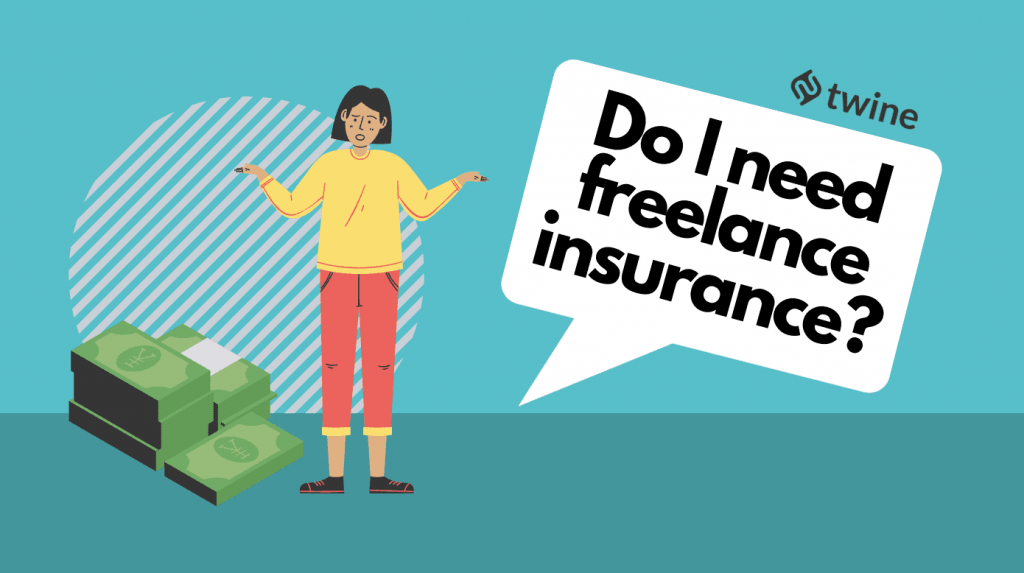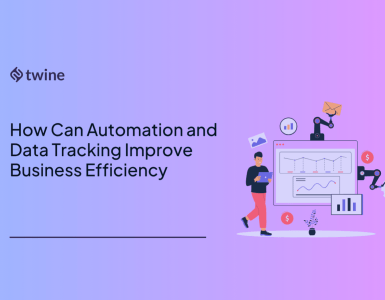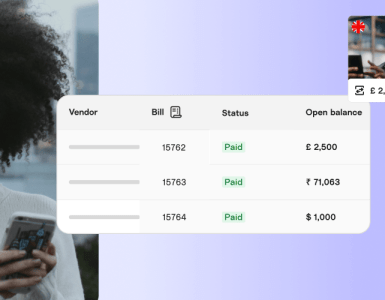
Being a freelancer is what some may call “a dream job.” And depending on how you build your business, it can be.
You are your own boss, the manager of your own time. And what’s even better is that you have the ability to constantly switch up who you’re working for. One week you may be working for one client and the next, you may pivot to working for another in an entirely different industry.
You blaze your own path there.
What isn’t always the fun part of working as a freelancer, though, is that logistical items that otherwise may have been taken care of by an employer, are up to you to research.
You have a lot on your plate. That’s why it’s understandable that you may let freelancer insurance — a type of business insurance meant for freelancers like you — slip your mind.
But trust us, if your client work is the entree, then freelancer insurance is the refreshing glass of water you never anticipated needing — but always appreciate having.
In this article, we’ll answer questions you may have, like “What is freelancer insurance?”; “What type of freelancer liability insurance might I need?”; and more.
By the time you finish reading, we hope you’ll feel more prepared to deliver your best work while also protecting yourself and your business.
What Is Freelancer Insurance?
We mentioned that being a freelancer isn’t like working for an employer. When you’re employed by a company, they often take on specific liabilities.
Now you’re your own boss. Whether you identify as self-employed or as a freelancer, you are a business owner, and that comes with risks. Since you’re not backed by a larger corporation, freelancer insurance acts as a shield to protect you and your business’s future in case something should happen.
Those “in case of” situations include anything that could lead to claims of negligence or that cause reputational harm. Freelancer insurance policies are designed to protect you from risks you can’t anticipate.
Think you’re ultra-careful? You may be, but there are some predictions you just can’t make! For that reason, it’s important to consider getting freelance liability coverage.
We’ll go over what type of freelance insurance you may want to consider, how it can protect you, and what you need to do to get it. Ready?
Let’s go.
What Type of Freelance Liability Insurance Might I Need?
You may be used to hearing about insurance that helps protect your health, your car, or even your apartment. But how does it come into play as a freelancer?
When you hear the word “liability,” think: protection. But know this — not all freelance liability insurance protects you from the same things.
There are two main types of freelancer insurance that could protect you and your business.
1. Professional Liability Freelancer Insurance
Professional liability insurance can protect you against the kind of things that aren’t necessarily tangible. Think about negligence, for example. It’s not something you can hold in your hand, but it is something a client could sue you for.
Again, we know it’s easy to say that you’re careful enough to avoid a mistake.
But that’s the thing — a client can claim that you made a mistake and were negligent, even if that’s not the case.
They could sue you anyway, which would mean hefty legal fees, lost working time spent on organizing communications around the suit, and possibly a scar on your business’s reputation.
Here’s an example:
Say you’re hired as a web developer to redesign a client’s website. You’ve done several of these projects before and you’re excited to flex what you know for this client. Things go according to schedule and the website launches without a hitch.
You collect your payment and move on to your next project.
Weeks later, though, the client comes back threatening to sue you.
They claim that they asked you to redirect a group of pages to their new site and you failed to do so. As a result, they tell you, they’ve missed out on a lot of potential revenue from the traffic the new site has gotten.
You’ll have to spend time reviewing your notes to see if it’s documented somewhere that you’d been told about the redirects. On top of that, you’ll most likely have to hire a lawyer, who will bill you by the hour, and that time can quickly add up with each consultation.
The time and money you’re spending on this is now bleeding into another client’s project, and you know your work is suffering. It’s not an ideal situation.
Without freelancer liability insurance, you may lose the client who is suing, a ton of money, and maybe even lose the current client, because your work isn’t as stellar as they’d hoped when they hired you.
If you had professional freelancer liability insurance, though, then when your client sues you, you could have protection helping to fight the lawsuit. This could help cover costs surrounding hiring a lawyer, any litigation, and the settling of the case (up to your policy limits).
It’s hard to imagine if you aren’t in the situation, but without liability insurance, the cost of cases like this could be the type of thing that could sideline your career.
And you’ve worked too hard for too long to have that happen!
2. General Liability Freelancer Insurance
General liability insurance can protect you against more tangible situations. It comes into play in the case of property damage, bodily injury, or a third-party accident.
As a freelancer, you’re your own boss, but you also may need to collaborate with a client or their team.
And in that case, you’re more at risk for those types of accidents than you’d imagine.
While you may think you’re responsible only for the work you hand in to your client when a project ends, you also could be held accountable for their well-being during the time they hire you.
Similar to cases of negligence, you can take every precaution against potential accidents, and they can still happen.
Let’s look at an example:
You’re a videographer that’s been hired by a brand agency to help with some of their client work. You don’t know the client, but you’ve worked with the agency before and are confident in the types of projects they send your way.
You show up for the first day of shooting and get set up. The morning goes well and the team breaks for lunch. You leave to get a sandwich a couple blocks away. When you return, there’s an ambulance on set.
As it turns out, one of the actresses in the commercial you’re filming tripped over one of the cords to your cameras and fell. Unfortunately, she broke her wrist!
The agency’s client is furious and decides to sue you.
They want you to pay for the actress’s medical bills, the time it will take to cast a new actress, and the lost time of the other people who were working on set that day.
Without freelancer insurance, these are the types of costs that could bury you financially. It’s scary to think about.
If you had freelance liability insurance coverage, you’d be protected.
Your policy could help to pay the actress’s medical bills, other requested costs, and legal fees associated with the lawsuit (again, up to your policy’s limit).
We can’t say how you could repair the relationship with that client, but we can say that you’ll be happy to still have that money in your pocket.
What Do I Need to Get Freelancer Insurance?
When it comes to getting insurance, it’s not as difficult as many make it out to be.
To get freelancer insurance, you’ll need to provide info on:
- What you do for work as a freelancer
- Where you work from
- Your business’s legal structure (e.g., sole proprietorship, LLC, etc.)
- How long you’ve been in business
Providing the info above can help you get a freelance insurance policy that’s right for you and your business specifically.
If you’d like to do more research before diving in, you can also compare quotes for FREE using Simply Business’s quote comparison tool.
Insurance is a choice you make for the well-being of your business, so if you have questions on how certain coverages will come into play, you also can choose to talk to a human.
Simply Business has licensed insurance agents ready to answer your questions at 844-654-7658.
Freelancer Insurance Sets Your Business Up For Success
When you set out to start your own business, “Do I need freelancer insurance?” probably wasn’t the first question on your mind. And that’s understandable.
After all, you started your own business for flexibility while doing the work you love.
An unfortunate reality, though, is that you can’t continue doing what you love if a lawsuit gets in the way of both your client relationships and your financial stability.
Starting a small business is a lot like building a house.
As much as you may want to focus on how beautiful the outside of the house is, if you don’t start with a good foundation, then one day the house could sink into the ground.
Not having freelancer business insurance is taking the risk that this house you work so hard on could become an unstable eyesore.
When it comes down to it, getting freelancer liability insurance is one way you can set up your freelance business for success in the long run.
We hope you’ll never be in a situation where you need to file a claim — but if you do, you’ll be glad you invested in insurance coverage!





